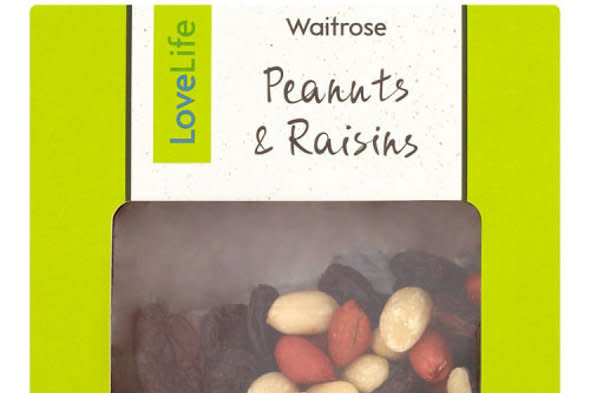Waitrose recalls packs of potentially deadly snack

Waitrose is recalling packs of peanuts and raisins over fears that they could contain potentially deadly other types of nut.
The company is warning that some packs of its Lovelife Peanuts & Raisins contain the wrong product mix, posing a risk to nut allergy sufferers.
"Waitrose is recalling its Waitrose Lovelife Peanuts & Raisins as it contains Waitrose Vitality Mix resulting in the undeclared presence of almonds, Brazil nuts and pistachio nuts," it says.
"This makes the product a possible health risk to anyone with an allergy to these nuts."
Anybody that's bought one of the packs, which contain five smaller packets and have a best-before date of 05/01/2017, should return it to the store for a full refund or call customer service on 0800 188884.
The company says it's contacted the relevant allergy support organisations, which will tell their members about the recall. It's also posting point-of-sale notices in its stores.
Many people that can eat peanuts perfectly happily are severely allergic to other nuts. Even a trace can cause potentially fatal anaphylaxis. Symptoms can include a raised skin rash, swelling of the mouth and tongue, difficulties in breathing, fainting and cardiac arrest.
As a result, food labelling legislation was introduced in December 2014 to help people identify and know exactly what is in their food, such as the 14 most common foods to cause an allergic reaction.
And the penalties for breaking the rules can be steep. Earlier this year, for example, restaurant owner Mohammed Zaman was given six years in prison after a customer died of a peanut allergy; Zaman had been using peanut powder instead of more expensive almonds.
As a result of the extreme risk, manufacturers are very careful about product labelling. Just last week, indeed, Lidl was forced to recall packets of its Alesto Honey Peanuts because they didn't list peanuts in English in the list of ingredients.
According to Allergy UK, the prevalence of peanut allergy among children in western countries has doubled in the past ten years. The latest advice is to minimise the chances of an allergy developing by gradually introducing small quantities of nuts into babies' diets from three months on.





